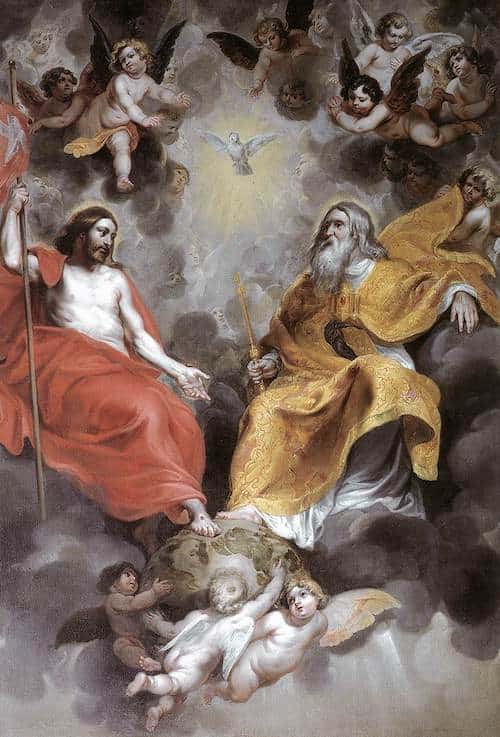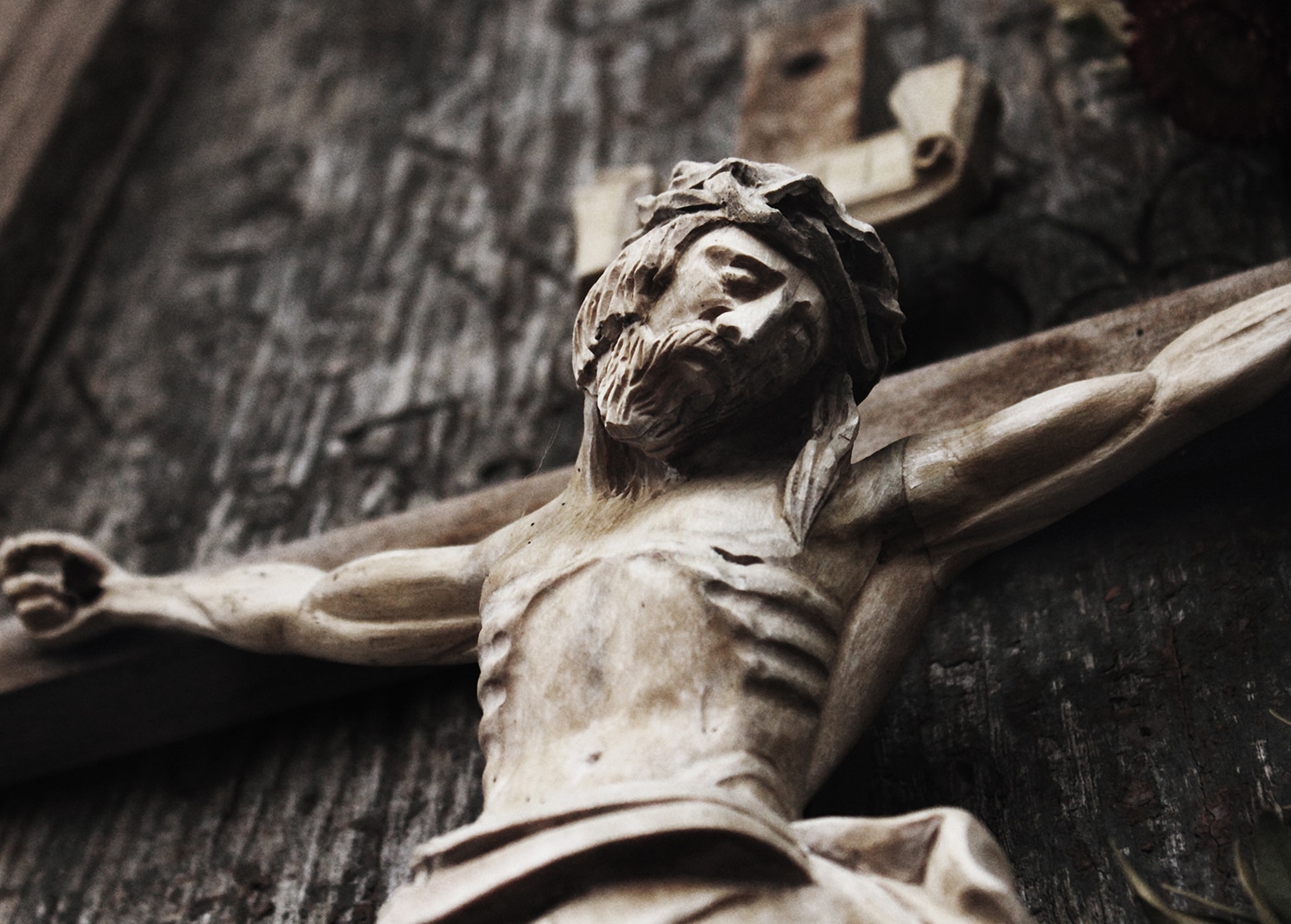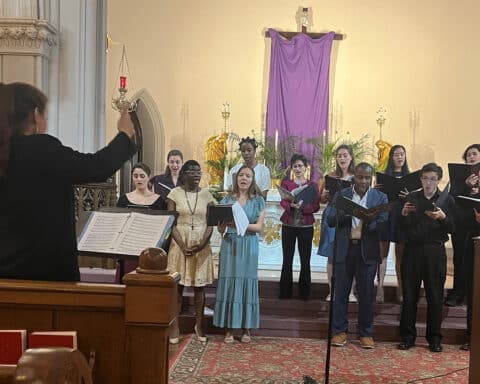God lives a most mysterious form of life. High above all things, dwelling in unapproachable light, God is the eternal Father, Son and Holy Spirit. The life of the Holy Trinity is resplendent with unutterable glory. The three-in-one rejoice in abundant bliss simply over being God.
“Father, forgive them, for they know not what they do.” (Lk 23:34)
The First Last Word
No human being on earth has the power to fathom or comprehend either the life or the bliss of the Holy Trinity. Analogies and comparisons might give us something of a glimpse, but all comparisons fall short of the mystery of the Most High. Yet, it pleases God — the good God who loves us — to share his triune life with us.
It was generous enough for God simply to create the world. It was a gratuitous gift all of its own just for God to give us all life and breath and freedom to pursue all that is good in the world. But the love of God for us is excessive indeed, and God did not stop at simply giving us the world. In a special gift of love going beyond everything that creatures have a right to expect from God, it pleased God to give us not only the world but to give us also himself.

Sanctifying grace
God has always planned not only to reveal the secret of his triune life to us but to draw us into the mystery. He calls us to know him and love him and enjoy his triune life in the depths of our hearts. To work such a wondrous mystery in our hearts, God grants us in our baptism the gift of sanctifying grace. Sanctifying grace is a real participation in the life of the Holy Trinity.
Human beings have no natural right to such a thing. We have no natural right to sanctifying grace. We have no natural right to participate in the triune life of God. Yet, it pleases God to lavish such grace upon us nonetheless. It pleases God to do so just because he is good.
It was for this reason, to lavish his grace upon us, to grant us a participation in his own wonderful life, that God the Father sent his eternal Son into the world. Jesus of Nazareth is the eternal Son of God come in the flesh. He freely chose to die for us on the cross. Yet, God raised him from the dead. He ascended into heaven, and now he stands before the Father of lights. Day and night, he pleads for us all to receive the grace of the Holy Spirit. Thanks to Jesus Christ, and no one else, all who are baptized in Christ can now say: “The love of God has been poured out into our hearts through the holy Spirit that has been given to us” (Rom 5:5).
A listening heart
The grace of the Holy Spirit poured into our hearts in baptism is a new and altogether higher form of life. The life of grace is not some lower form of life such as plant life or animal life. The life of grace is also not simply a more human life of the kind we received from our parents. We do not need baptism to give us more natural, biological, human life. The life of grace is also not an angelic form of life wonderful though the life of angels may be. The life of grace is, rather, something altogether supernatural. It is beyond the natures of all created beings whatsoever. The life of grace is something of God’s own life — divine life — animating the depths of the soul.
Those who live the life of grace still live their natural human form of life. They still sleep, eat, drink, talk and walk the face of the earth with others, but in the depths of their souls, something supernatural is going on. In the depths of their souls, they are living something of the life of the Holy Trinity.
Most people are unaware of the greatness of the gift given to them in their baptism, but all of the baptized live under the call to wake up to it. The life of grace is a gift of inestimable worth. It is the pearl of great price. It is the treasure buried in the field of the heart. It is like a mustard seed.
Sanctifying grace tends to grow into a conscious union of hearts with the Most High.
Yet, for such a wondrous event to take place in our hearts, the most fundamental and essential quality we need is a faith that listens to the Word of God. Many people think that Solomon asked for wisdom, but he did not. Rather, Solomon asked for a listening heart (cf. 1 Kgs 3:9). In turn, God poured out on Solomon an abundance of wisdom. The lesson is clear. If we ask for the grace of a listening heart and take practical steps to acquire one, then true wisdom — a loving awareness of the presence of God — will dawn in our hearts in due season.

Life of prayer
One special form of listening to God is meditation on the seven last words of Jesus. The last words of a person can move us to the core because of their power to reveal the person in a special way. St. Thérèse of Lisieux‘s last words were: “My God, I love you!” Pope St. John Paul II’s last words were: “Let me go to the Father’s house.” If listening to the last words of saints moves us, how much more should the last words of the Lord move us? The more we listen to his seven last words the more our hearts come to reflect his own — the more our hearts will live something of his own eternal Sonship in the Spirit.
“Father, forgive them, for they know not what they do” (Lk 23:34, RSV).
“Jesus died praying,” Joseph Ratzinger once observed. Even in the midst of crucifixion, the heart of Jesus was with his Father. The first thing he does on the cross is call upon his Father. The first thing he asks is for the mercy of the Father upon sinners. Jesus lived his life in prayer to the Father, and he died in a state of prayer to the Father. The heart of Jesus was all prayer to the Father.
Among all the prayers of the people of Israel, the prayer of the Lord Jesus was unique. Jesus was the first to call God his Father — “Abba.” None of the patriarchs or prophets dared to call God their personal Father. But Jesus did. In so doing, he lived out his eternal and divine Sonship in a very human way. Prayer is a very human thing, and Jesus simply called upon his Father in prayer.
Jesus also taught his disciples to call upon Our Father, but it was not his intention for us simply to imitate him outwardly in using the word “Father.” Rather, the Lord’s intention was for our hearts to be united inwardly with his in one prayer life. His purpose in teaching us the Our Father was later fulfilled when the Spirit fell upon his disciples. Once the Spirit came, the hearts of the first Christians also began to cry out “Abba, Father!” (cf. Rom 8:15, Gal 4:6). The heart of the risen Lord Jesus in heaven and the hearts of his disciples on earth were united in a single, common, interior prayer life. Even now, heaven and earth are united in the prayer life of Christian hearts.
In his crucifixion, the Lord Jesus asked the Father to forgive his persecutors. In so doing, Jesus practiced what he preached in the Sermon on the Mount (cf. Mt 5:44). In the Our Father, we too ask God to forgive those who trespass against us. We ask also for the grace to be forgiving ourselves. Forgiveness is the only way home to the Father’s house in the heavenly places.
Participation in the life of the Trinity might seem like an abstraction. It might seem far removed from our daily life, but the Lord Jesus has brought the mystery down to earth. How, practically speaking, do you and I participate in the life of the Trinity? Let’s begin with an Our Father. One Our Father devoutly said is a bigger deal in heaven and on earth than anyone might think.





